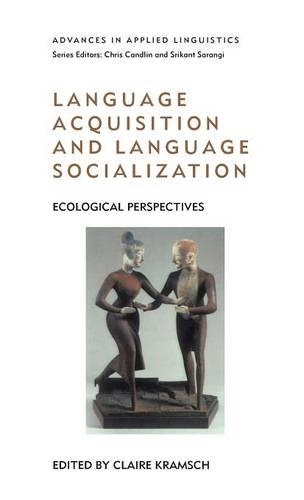
Language Acquisition and Language Socialization: Ecological Perspectives
(Hardback)
Available Formats
Publishing Details
Language Acquisition and Language Socialization: Ecological Perspectives
By (Author) Claire Kramsch
Bloomsbury Publishing PLC
Continuum International Publishing Group Ltd.
1st February 2003
United Kingdom
Classifications
Tertiary Education
Non Fiction
Sociolinguistics
401.93
Physical Properties
Hardback
320
620g
Description
This is an outstanding collection of papers by top scholars in a range of disciplines who shed stimulating, complementary insights into the social, cognitive and semiotic frameworks that shape both the acquisition of language, and the constitution of social actors through that process. The intentionally loose ecological framing of the volume provides an arena within which a range of perspectives, all united by their opposition to a mechanistic view of language acquisition, can enter into dialogue with each other. This is a most stimulating collection, with a range of insightful investigations of settings as diverse as an autistic child learning to interact with others on the playing field, professional gate-keeping encounters, and foreign language classrooms.' Professor Charles Goodwin, University of California at Los Angeles The book brings together well-known scholars in two relatively distinct fields, language acquisition and language socialization, and from a variety of orientations within applied linguistics to describe language development from a relational perspective. The papers in this volume are a response to three main questions: 1) What conceptual models best capture the ecological nature of language learning 2) What research approaches are best likely to illuminate the relationship between language and social structure 3) How is educational success defined for language acquisition and language socialization
Reviews
"This volume heralds a significant leap in our understanding of issues in language development, and is crucial reading for all language teachers." -- Vai Ramanathan, Associate Professor in the Linguistics department at the University of California, Davis.
'For those of us working in the field of EAL, this book is highly relevant. Its ten chapters cover the breadth of the field and, as it suggested, represent what one might call interdisciplinary-in-interaction. In addition to an excellent introduction which sets out the theoretical framework for the chapters which follow, there are commentaries ending each of the four parts into which the book is divided. These commentaries offer fascinating insights into the writers' discussions during a colloquium which preceded the writing of the book...This is an excellent book. Readable, thought provoking and intellectually engaging.' Angela Creese, University of Birmingham, UK, National Association for Language Development in the Curriculum -- Angela Creese, University of Birmingham, UK, National Association for Language Development in the Curriculum, Autumn 07
Author Bio
Claire Kramsch is Professor of German and Foreign Language Acquisition at the University of California, Berkeley.
